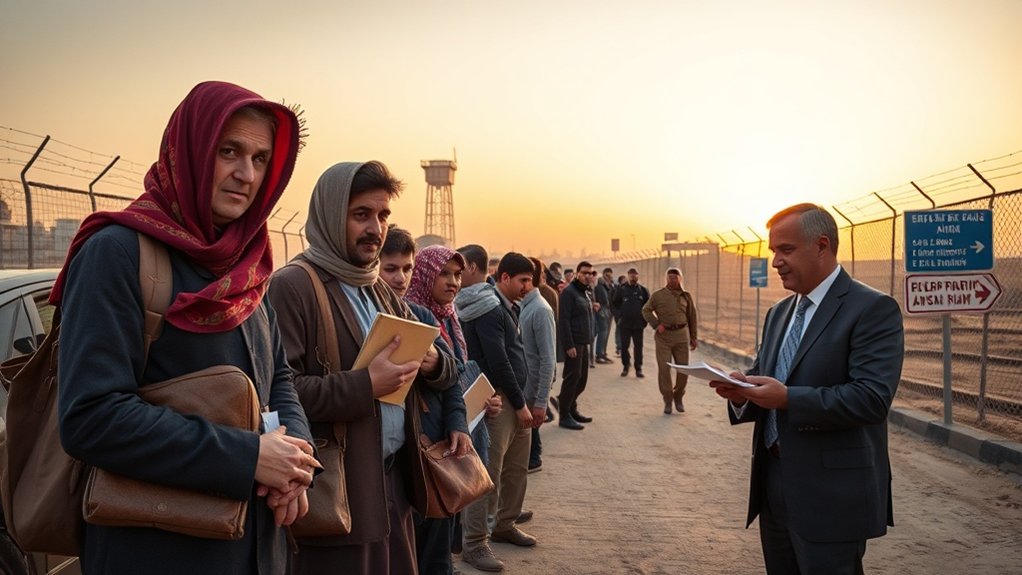If you’re considering travel from Afghanistan while your immigration documents are still pending, you’re facing some tough decisions. Every move you make now can affect your future status and your ability to return. Vieira Braga Advogados stresses that it’s not just about your paperwork—local politics, embassy protocols, and shifting regulations all play a role. Before you make any plans, there are several risks and strategies you need to weigh carefully…
Understanding the Risks of International Travel While Documents Are Pending

While your application or immigration documents are still being processed, traveling internationally can put your status at risk. If you leave Afghanistan before your request is approved, you may lose the opportunity for reentry or even have your application denied. Authorities might interpret your departure as abandonment of your claim or application, especially if your circumstances change while you’re away. Reentry is not guaranteed just because you’ve submitted paperwork or started the process; incomplete or pending cases often mean officials can’t grant you the legal protections you need.
Your absence can also result in missed interviews, deadlines, or requests for additional evidence. These setbacks can quickly derail your application. Notifications or correspondence might not reach you, making it hard to respond in time. By leaving before approval, you’re depending on unpredictable timelines and border decisions. Always recognize that traveling too soon introduces serious, potentially irreversible consequences for your status and plans.
In these situations, seeking professional guidance from an immigration lawyer is crucial to avoid overlooked details that could jeopardize your application or legal status.
Key Factors to Assess Before Leaving Afghanistan
Before you make plans to leave Afghanistan, take time to review the conditions that could affect your travel and reentry. It’s easy to overlook critical details in your excitement or anxiety about your journey, but being prepared will save you trouble later. Focus on the practical realities you’ll face, both at departure and when you try to return.
Here are three key factors to assess before leaving Afghanistan:
- Current Political and Security Situation: Ongoing instability or sudden changes at the borders can disrupt your travel plans. Check recent travel advisories and stay informed about evolving events.
- Local Exit Regulations: Departure requirements can be strict. Investigate whether you need permits, specific exit documentation, or clearances before boarding a flight out of Afghanistan.
- Consular Support Availability: Embassy and consulate services fluctuate, and limited support could complicate emergencies. Identify where you can get help if you face issues abroad or during your return journey.
When preparing to leave, keep in mind that immigration laws and requirements in your destination country may change frequently, so staying informed and seeking professional support is advisable.
Evaluate these factors to protect your travel plan.
Common Immigration Documents and Their Implications for Reentry

Once you’ve assessed the main risks and requirements for leaving Afghanistan, your focus should shift to the immigration documents that will shape your ability to return. The type and status of your documents—such as visas, entry permits, pending asylum applications, or humanitarian parole—directly impact your reentry prospects. If you hold a valid visa or residency permit, you’ll generally encounter fewer entry obstacles, provided these documents remain current during your travel.
However, if your documents are pending, expired, or under review, border officials may question your eligibility to return. It’s crucial to know the expiration dates, conditions, and whether your specific case receives protection under special travel authorizations or reentry permits. Always verify your document’s status before you depart. Misunderstanding requirements or presenting incomplete papers could lead to denial of entry, delays, or even legal complications upon your return. Proper documentation is your primary safeguard for smooth reentry. Consulting with an immigration lawyer can help you minimize the risks of mistakes that could jeopardize your immigration status before making travel plans.
Strategies to Minimize Legal Challenges During Travel
Although travel plans can feel overwhelming, anticipating legal hurdles will help you avoid unnecessary complications. Careful planning and awareness of possible setbacks give you the upper hand. When your immigration documents are pending, you need to remain vigilant about following proper protocols, staying updated, and protecting your legal status at every step.
To minimize legal challenges during travel, focus on the following strategies:
- Stay Informed: Regularly check for changes to travel regulations, visa requirements, or updates from immigration authorities affecting Afghans. Laws may change quickly and impact your eligibility to reenter.
- Maintain Documentation Copies: Keep physical and electronic copies of all relevant documents—application receipts, approval notices, and any official correspondence. Quick access will streamline responses to requests from officials.
- Consult Legal Experts: Reach out to an immigration lawyer before you travel. An expert can review your status, highlight risks, and provide guidance tailored to your specific case. Taking advantage of personalized legal support increases your chances of a successful journey and protects your status throughout the immigration process.
Practical Steps for Safe Border Crossings

Even with thorough preparation, crossing borders demands vigilance and careful attention to detail. You should always keep all travel documents, including passports, visas, and supporting paperwork, organized and easily accessible. Review your documents before you reach the border to confirm they’re valid and match each other exactly. Dress neatly and remain calm when approaching border officials, since your demeanor can influence interactions.
Be ready to answer questions clearly and honestly—only provide information that is requested, and avoid volunteering extra details. If you’re traveling with family members or minors, ensure you carry legal permissions or custody documents if necessary. Prioritize safety by staying aware of your surroundings, avoiding unofficial crossing points, and only using designated checkpoints.
If you face a delay or examination, don’t argue with authorities. Instead, politely request clarification. Respect local laws and customs at all times, as compliance helps you move forward with fewer complications. For those traveling to the U.S., it is especially important to have all required immigration documentation prepared, as officers may inquire about your visa status, purpose of visit, and ability to support yourself while documents are pending.
Communications With Embassies and Immigration Authorities
You’ll need to know how to contact embassies and immigration authorities before you travel or plan your return. It’s important to understand how to request documents and what steps to take if you face an emergency. Let’s look at the key protocols and communication channels you should use. Consulting with an immigration lawyer can further improve your understanding of required documentation and ensure you are following proper procedures during your travel or reentry process.
Initiating Contact Protocols
When preparing for international travel, especially between Afghanistan and other countries, it’s vital to initiate prompt and clear communication with embassies and immigration authorities. Establishing the right contact protocols helps you avoid unnecessary delays or confusion as your documents move through the approval process. Start by identifying the correct departments or officers responsible for your travel needs. Use official channels only—such as email addresses or phone numbers listed on embassy websites—to minimize risks and protect your information.
Here’s how you can get started:
- Gather all relevant contact information for the embassies and authorities involved in your case.
- Prepare a concise introduction explaining your situation and travel intentions.
- Track every communication, saving emails and noting call details, for future reference and follow-up.
Clear communication builds trust and speeds your journey. Consulting with experts on immigration law complexity can further ensure your interactions with authorities are accurate and effective.
Document Request Procedures
Although embassies and immigration authorities follow structured protocols, requesting essential travel documents demands careful attention to detail. You need to verify all required documents and ensure your application is complete before submission. Double-check identification, supporting paperwork, photographs, and any necessary fees. When communicating, always use clear, respectful language and follow the embassy’s specific instructions. Make sure your contact information is accurate, and respond promptly if additional information is requested.
Prepare copies of all communication and receipts. Keep file numbers, reference codes, and submission dates for easy tracking. Persistently monitor your request’s status using official portals or lines of communication. If guidelines suggest in-person appointments or interviews, schedule and attend them promptly. By maintaining organization and accuracy, you improve your chances of a successful document request process. Seeking specialized legal guidance can further safeguard your immigration process against complications and ensure compliance with evolving regulations.
Emergency Communication Channels
If an urgent situation arises during your travel or document process, accessing the right emergency communication channels is crucial. You need to act quickly and know exactly who to contact to resolve issues like lost documents or unexpected travel delays. Reaching out to embassies or immigration authorities efficiently can make a significant difference in your case outcome.
Here’s how you can establish efficient emergency communication:
- Save Contact Details: Keep embassy and immigration office emergency numbers saved on your phone and in a physical notebook.
- Use Official Channels: Always use official email addresses, emergency phone lines, or approved online portals for urgent communication.
- Prepare Essential Information: When reaching out, have your passport details, case numbers, and any pending document application receipts ready to share immediately.
This approach ensures your communication is prompt and effective. Having support from professional guidance can further assist in navigating urgent immigration issues, reducing the risk of complications and delays.
Legal Support and Resources for Afghans Abroad
Facing legal challenges abroad can feel overwhelming, but you don’t have to navigate them alone. There’s a wide network of legal support specifically designed for Afghans facing complexities with visas, asylum, or reentry while their documents are pending. Start by reaching out to local immigrant legal aid organizations in your host country. Many non-profits and pro bono lawyers offer consultations, guide you through documentation, and help you understand your rights. Online platforms run by international organizations—like the UNHCR—provide detailed guidance and connect you with trustworthy attorneys.
If you encounter urgent situations, embassies often have emergency resources or lists of legal professionals who speak your language. It’s wise to join community groups or online forums where fellow Afghans share their experiences and advice about dealing with authorities and legal processes. Staying proactive and informed dramatically increases your chances of a smooth reentry once your travel documents are approved. Consulting an immigration lawyer can increase your chances of success by helping you manage deadlines, documentation, and legal requirements throughout the process.
Frequently Asked Questions
Can I travel to Afghanistan with a travel document?
Yes, if the travel document is valid and recognized by Afghan authorities, but entry depends on visa requirements and airline regulations.
Is USCIS extending certain fee exemptions and expedited processing for Afghan nationals?
Yes, USCIS continues special measures, including fee waivers and expedited processing, to support Afghan nationals under humanitarian and relocation programs.
How Long Does It Take to Receive a Travel Document Decision?
You’ll usually wait anywhere from a few weeks to several months for a travel document decision, depending on the specific type of document and the processing times of the issuing authority. It’s important to monitor your application status online and respond promptly to any additional requests for information. Don’t plan any international travel until you receive approval, as leaving without the correct documents could jeopardize your ability to reenter the country.
Can Family Members Travel Together if One Person’s Documents Are Pending?
Family members can’t all travel together if one person’s travel documents are still pending. Each person, including children, needs their approved travel document before leaving. If you try to travel as a group without everyone’s documents, you risk delays or being denied boarding. It’s best to wait until every family member has received their approval. Once everyone’s documents are ready, you can safely make travel plans and reenter without issues.
What Are the Most Common Reasons for Document Processing Delays?
You’ll most often face document processing delays because of incomplete applications, missing information, or errors in the forms you submit. Sometimes, background or security checks take longer than expected, especially if your name matches someone in their system or there’s a need for more evidence. High application volumes and understaffed government offices can also slow things down, so stay proactive, double-check your paperwork, and respond quickly to any requests for more details.
How Can I Check the Status of My Pending Immigration Documents?
You can check the status of your pending immigration documents by visiting the official website of the immigration authority handling your case. Most agencies offer online case status tools where you’ll enter your receipt number or case details. You can also call their customer service hotline or use email to request updates. Don’t forget to keep your receipt notice handy, since you’ll usually need it to verify your identity and track your application.
Are There Specific Airlines Recommended for Safer International Travel From Afghanistan?
Yes, you should choose airlines with strong safety records and reliable international operations, such as Qatar Airways, Turkish Airlines, Emirates, and Flydubai, which frequently operate flights from Afghanistan. Always check the latest travel advisories and confirm that your airline is operating as scheduled. Prioritize airlines with trusted reputations, clear communication, and up-to-date security measures. It’s important to book directly with the airline and monitor updates regarding your travel route.
Conclusion
If your immigration documents are still pending, traveling internationally comes with serious risks. You need to weigh your options carefully, stay informed, and always keep your paperwork in order. Planning ahead and seeking advice from legal professionals will help you avoid complications at borders and protect your immigration status. Don’t hesitate to reach out for support—taking these steps now can make all the difference for your future reentry and peace of mind.

